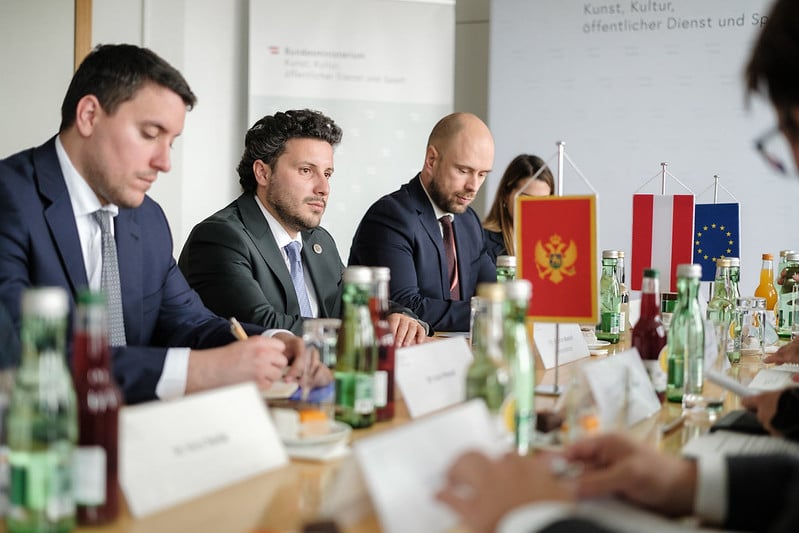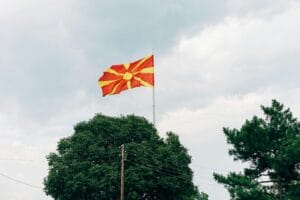Outgoing PM Abazović meeting with an Austrian delegation (Flickr, 2022)
Following an analysis by the Montenegrin Ministry of European Affairs published on 25 November, Montenegro has reiterated its reservations about the Belgrade-led Economic and Political Zone initiative. The expansion of the initiative seems anything but forward-looking.
Open Balkan – An idea from the past in a new context
The Open Balkan initiative is an idea that dates back to the early 1990s, after the break-up of Yugoslavia. The subsequent Yugoslav wars soon brought the idea, then known as the “mini-Schengen area”, to a halt. As relations between many Balkan countries improved, President Edi Rama of Albania suggested an adapted version of the idea in 2018. Currently, Serbia is at the forefront of promoting the Open Balkan, in which the founding countries of the initiative (Serbia, Northern Macedonia, and Albania) are cooperating in the area of free movement of people, goods, services, and capital. Hence, the initiative is supposed to function as a platform for economic and political progress.
Dritan Abazović, PM of Montenegro, and Zoran Tegeltija, president of the Council of Ministers of Bosnia and Herzegovina, also attended the Open Balkan summit in Ohrid on 8 June 2022, and on that occasion expressed their intention to participate in the initiative in the future. Representatives of the European Union and the United States support the initiative. Open Balkan works with an open-door policy in which Kosovo, Bosnia and Herzegovina and Montenegro are invited to join the initiative. The idea of the Open Balkan may be old, but in the new geopolitical context of the Western Balkans and the European integration processes these countries have entered, there is a renewed interest.
Montenegro backtracks, other countries are also critical
However, Montenegro has now bolstered its reservations about the initiative with the analysis by the Ministry of European Affairs. The analysis followed after the Open Balkan Summit in Ohrid, where Abazović stated that he viewed the initiative as “favourable” but first needed to examine it thoroughly with his government before making a decision. A commission was formed by Minister of European Affairs Jovana Marović, who resigned from her post on 25 November as she was dissatisfied with the way the deadlock in Montenegrin domestic politics affected the EU accession process.
Following the commission’s analysis, Abazović was less positive about Montenegro’s ambitions to join the Open Balkan initiative. He openly stated that the Open Balkan lacks transparency and is too reliant on good relations between “charismatic leaders.” Consternation over the statements seems to fit the current state of Montenegrin politics, which finds itself in turmoil. The statements by outgoing PM Abazović, who will step down after a vote of no confidence, followed after outgoing deputy PM Vladimir Joković told Montenegro it might sign an agreement on the Open Balkan initiative. However, according to Abazović, joining the Open Balkan was never discussed. Meanwhile, Bosnia and Herzegovina and Kosovo have both indicated they will not join in the near future.
The economic importance of the Open Balkan has been overestimated, according to the unaffiliated countries, as the countries have already been economically linked in the CEFTA trade agreement since January 2007 (and North Macedonia since January 2006). CEFTA was once created by the Visegrád Group, but these countries have since left the trade agreement as they have become full EU member states. On behalf of Kosovo, the United Nations Interim Administration Mission in Kosovo is a member. The aim of this agreement is to establish free trade agreements between countries while promoting integration into Western institutions. With that, there does seem to be overlap with the Open Balkan.
Hesitation stems from political division and EU integration concerns
The hesitation of countries to participate in the Belgrade-led initiative for political reasons seems to indicate the influence of domestic politics. Kosovo and Serbia continue to be at odds, reaching a new climax last week which necessitated mediation by the EU and the US. In both Bosnia and Herzegovina and Montenegro, many ethnic Serb parties (and in Montenegro also ethnic Albanian parties) welcome the initiative because it will strengthen political ties between the countries in addition to economic ones. This leads to reluctance on the part of other parties. In Montenegro, the opposition parties strongly oppose the idea of joining the Open Balkan. Abazović mentioned about the division: “We will see what will happen in the future. I think there are many political manipulations on this topic among the political parties.”
Critics say that the Open Balkan is unnecessary because its purpose is already embedded in the EU integration process, which each of the countries is currently part of – albeit at different stages. This criticism is essentially a paradox. Regional stability and better mutual relations are indeed part of the European integration process (the normalisation of relations between Kosovo and Serbia, for instance, is a rock-solid requirement for those two countries), but it is precisely the tools to actually achieve that stability that currently seems to be missing. Also, the EU is often criticised for not being able to hand these tools to aspiring members.
EU Enlargement Commissioner Oliver Varhelyi explained in his contribution presenting Brussels’ support for the initiative that the EU sees the Open Balkan as an opportunity to accelerate the EU integration process. But as with Macron’s recent proposals for the European Political Community, the Open Balkan also seems to be viewed with suspicion by the Western Balkans, where there are fears that EU membership will be replaced by other memberships, rather than strengthening the integration process. Whether the Open Balkan will be a success depends largely on how its constituent countries shape it. Until then, it seems to divide rather than unite.
Author: Mathieu Neelen
Sources: BalkanInsight1, BalkanInsight2, CEFTA, DeutscheWelle, EuropeanWesternBalkans, SWPBerlin
Photo: Flickr



